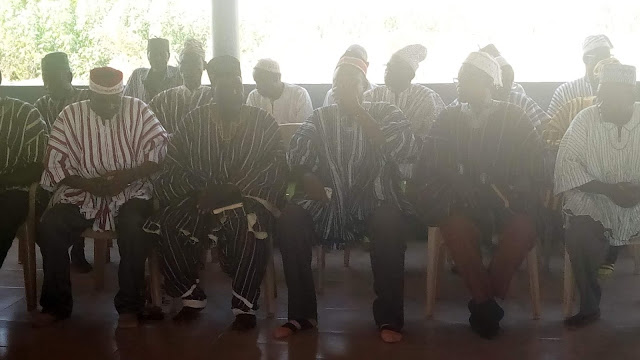 |
| Arigurana Naa Timaritaba K Anzoni IV. |
The Chief and People of the Arigu community in the West Mamprusi District of the Northern Region has celebrated their annual “Tingana Festival” amidst drumming and dancing and the outdooring of the chief of the area, Arigurana Naa Timaritaba K Anzoni IV.
 |
| A Cross section of the youth singing group in Arigu |
The
Tingana festival is celebrated to mark the harvest of the staple food crop, and
to give thanks to God almighty for his blessings, the festival is also meant to
thank the gods of the land and ancestors for the protection and guidance of the
inhabitants throughout the year.
 |
| These are Sub and Divisional Chiefs sitting down as part of the outdooring celemony |
It is a tradition that is held biennially to
afford the chief of Arigu community to be
outdoored during the festival to address his people and the general public
on the community’s development status and plans and to wish the people well as
the year comes to an end.
In an address delivered on his behalf during the
festival Naa Anzoni IV, admonished the citizens in the area to be weary of evil
days that create misunderstandings between families, neighbors and fractions
within communities and called on the people of the community to remain united
in order to foster development of the individual and the community at large.
The Chief expressed gratitude to the Municipal Director of Education for
posting teachers to augment the teacher deficit in the community.
He however
indicated that, the teacher- pupil ratio in the schools are still not the best
and wish that more teachers were posted to the community.
Naa Anzoni IV appeal
to the government to provide classroom blocks accommodate pupils still sitting
under trees in his traditional area.
He urged parents to desist from pushing
their girl-child into early marriages, school drop outs and to kayaye but to
ensure their wards are retained to complete school.
Whilst commending
the community members for their personnel contribution in purchasing
furniture and other essential equipment
for the operations of the CHIP compounds, the chief also lauded the
efforts of the Municipal Health Director
and staff, the Municipal Chief Executive and the Assembly for their immense
contributions in enhancing health delivery in the Arigu community.
Touching on Agriculture the
Naa Anzoni indicated that, the people
of Arigu and Bisigu are farmers and have a vast and fertile land for both
commercial and subsistence farming of various food crops, sheatrees for
sheanuts oil extraction and fishing long the White Volta.
He stated that the
community benefited from the fertilizer subsidy under the government flagship
program of Planting for Food and Jobs in 2017, 2018 farming season and has
paid all their loans.
He called on the government through the Municipal
Director of Agriculture to remember the community in implementing agriculture
interventions.
Naa Anzoni entreated landlords to construct toilet facilities in
their homes to help prevent open defecation.
He therefore called on all
citizens in the community and for that matter West Mamprugu to vote yes in the
upcoming referendum on the 27th December 2018, for the creation of
the North East Region.


















